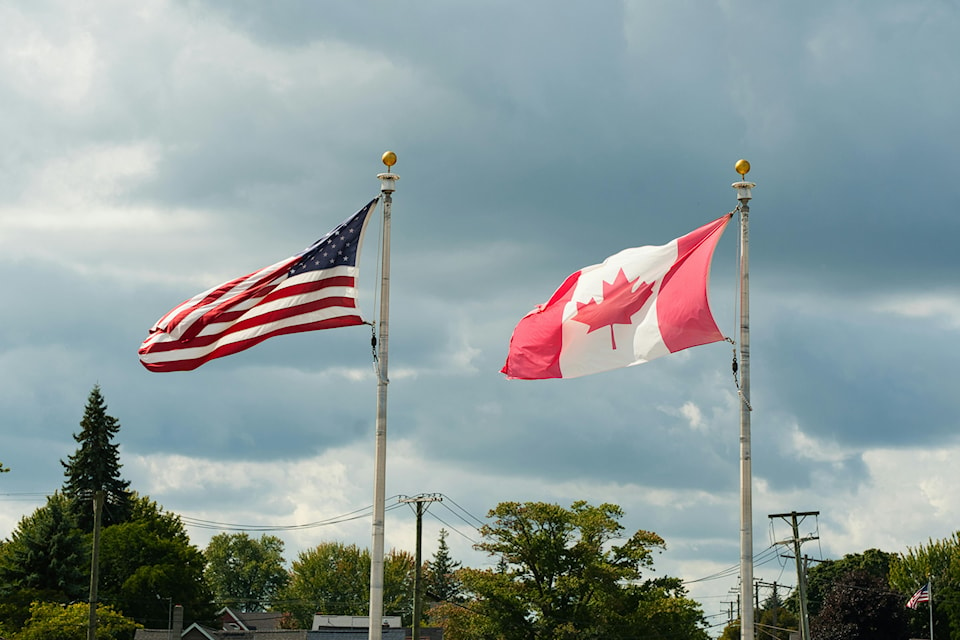Many Canadians are worried about tonight’s U.S. election as the ramifications could drastically impact the economy and the media.
Most academics have already been discussing possible impacts on Canada, with a panel held at McMaster University and Wilson College of Leadership and Civic Engagement on Oct. 22.
The panel's experts discussed the social, political, and economic implications for Canada. Many of the issues raised were related to a Trump presidency.
This panel included Terry Flynn, an Associate Professor and Graduate Director of the Masters of Communication Management program at McMaster. Within the panel, Flynn highlighted what Americans and Canadians must brace for from the media.
“The world is being primed for the next category five hurricane called Domala,” Flynn said, “A surge of misinformation, deepfakes, the legitimacy of the election prime framing from the Republicans.”
Flynn said one concern he has is Canadian politicians taking cues from American politicians about what is effective from a political standpoint. Flynn delved more into what this looks like in an interview with Humber Et Cetera.
He said the Conservative Party has already begun to use negative framing against Trudeau and the Liberal Party in Canada, cues taken from the Republican Party may come into play for next year’s Federal election.
“To what degree will democracy and the legitimacy of our elections be questioned? You put that in Canadians minds that our institutions are untrustworthy, and that’s the most pressing thing,” Flynn said.
Another member of the panel, Academic Director for Wilson College and professor of Political Science Don Abelson, echoed these claims.
“I think the party that’s most likely to embrace some of the policies of Donald Trump would be the Conservative Party. You might have some elements in the Bloc [Québécois],” Abelson said,
“There are already elements of the Conservative Party that embrace a lot of the rhetoric of Donald Trump on immigration, on the economy and on other things,” Abelson said.
This can be seen through the Canadian Conservative Party's recent ad campaign from four months ago, posted on Pierre Poilievre's YouTube channel.
The ad campaign focused on Justin Trudeau and Liberal policies, echoing Republican ad campaigns in the U.S. targeting Kamala Harris.
Flynn said social media and people who receive news exclusively from these online platforms are more susceptible to this type of negative information.
He said George Gerbner, a Hungarian American journalist, has research from the 1950s and ‘60s that explains how the more negative information is consumed, the more people believe the world is a meaner and scarier place.
“Social media channels (are) something of grave concern because there are no guardrails there,” Flynn said. “You are subject to algorithmic news or information gathering through TikTok or any of your other social channels that are going to be flooded with whatever side that you are most often going to get information on.”
Besides the issues that could be observed within the media, Abelson said Canada’s strong bilateral relationship with the U.S., specifically with cross-border trade, would be heavily impacted.
He said the North American Free Trade Agreement (NAFTA), or the U.S.-Canada-Mexico Free Trade Agreement, is something that would be impacted depending on the results of the election, with the pact up for renegotiation in 2026.
He said Canadian policymakers are concerned about Americans slapping tariffs on steel exports, softwood lumber, and other commodities traded with the U.S.
"Whenever we hear the term protectionism, either coming from a Democratic or Republican president, we are concerned,” Abelson said, “With Trump, he’s also added a term that we’re concerned about, which is isolationism, which means the United States would withdraw many of its commitments on the world.”
Protectionism policies restrict international trade in favour of supporting domestic industries. Isolationism is a doctrine in which one’s country isolates itself from the affairs of other nations.
Abelson said if Trump were to get elected, Canada would share a feeling of antipathy with the world about the decision. He said it would be highly unlikely if Canada attempted to isolate itself from the U.S.
“The reality is we continue to rely heavily on the U.S. Our stature in the international community tends to grow when we are in lockstep with the U.S.,” Abelson said.
Abelson said Canada would most likely also have to act as a buffer against any policies created by Trump that undermine bilateral and global interests.
Regardless of who wins, however, Abelson said Canada needs to strengthen its relationships beyond the U.S. federally. About 30 states have Canada as their largest export market, so it would be in Canada’s best interest to work closer with state governors.
Abelson and Flynn said that despite the results, it’s unlikely Trump would go away. Both said no matter what, democracy would be under attack.
“He’s already opened the door to question the legitimacy of the election. That framing can have an impact on peaceful transition in January 2025,” Flynn said.
The two say Canadians need to remain vigilant and stay tuned to how the election results will play out.
“Dec. 11th, the votes have to be certified […], and then in January, they have the ceremonial transitional government,” Flynn said. “It ain’t over until January.”
Abelson said young people across all spectrums in the country have to actively participate in the nation’s political life of the nation.
“If there’s one last thing to take away from what has happened in the United States, it is that Canadians, thankfully, can participate in the democratic life in our country,” he said.



.png;w=120;h=80;mode=crop)
